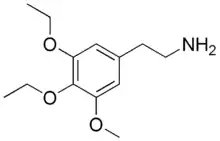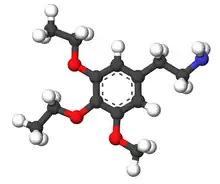Asymbescaline
Asymbescaline (3,4-diethoxy-5-methoxyphenethylamine) is a lesser-known psychedelic drug. It is a homolog of mescaline. Asymbescaline was first synthesized by Alexander Shulgin. In his book PiHKAL, the dosage range is listed as 200–280 mg, and the duration listed as 10–15 hours.[1] Asymbescaline produces few to no effects.[1] Very little data exists about the pharmacological properties, metabolism, and toxicity of asymbescaline.
 | |
 | |
| Names | |
|---|---|
| Preferred IUPAC name
2-(3,4-Diethoxy-5-methoxyphenyl)ethan-1-amine | |
| Other names
3,4-Diethoxy-5-methoxyphenethylamine | |
| Identifiers | |
CAS Number |
|
3D model (JSmol) |
|
| ChEMBL | |
| ChemSpider | |
PubChem CID |
|
| UNII | |
CompTox Dashboard (EPA) |
|
InChI
| |
SMILES
| |
| Properties | |
Chemical formula |
C13H21NO3 |
| Molar mass | 239.315 g·mol−1 |
Except where otherwise noted, data are given for materials in their standard state (at 25 °C [77 °F], 100 kPa).
Infobox references | |
See also
This article is issued from Wikipedia. The text is licensed under Creative Commons - Attribution - Sharealike. Additional terms may apply for the media files.